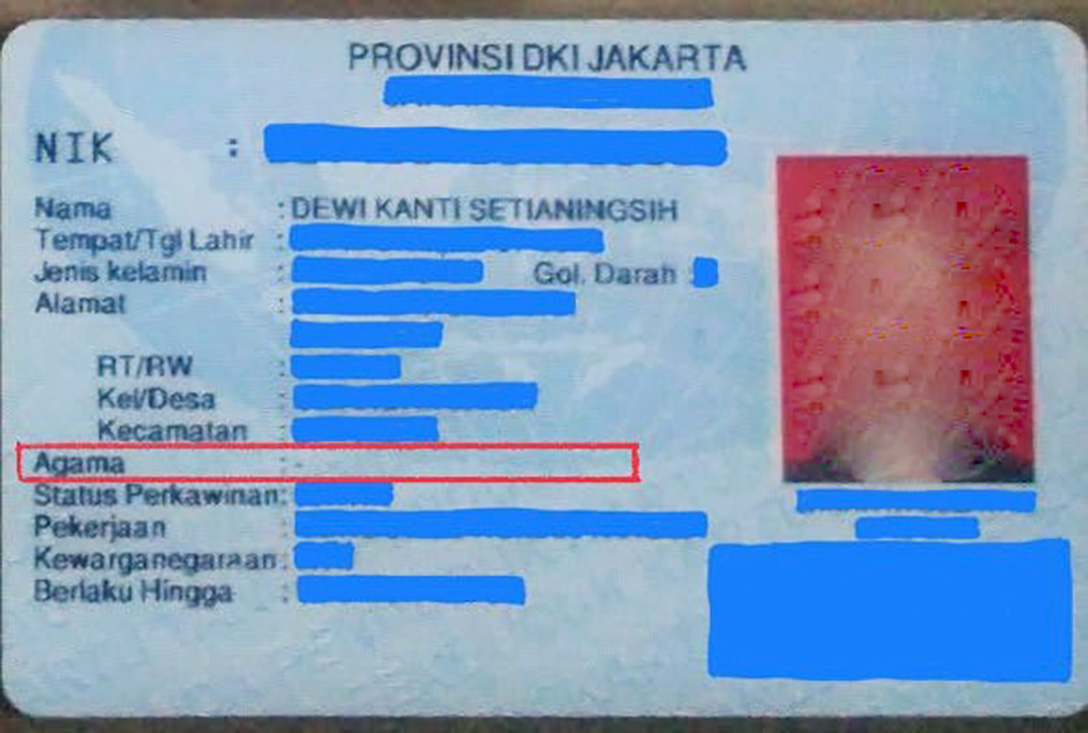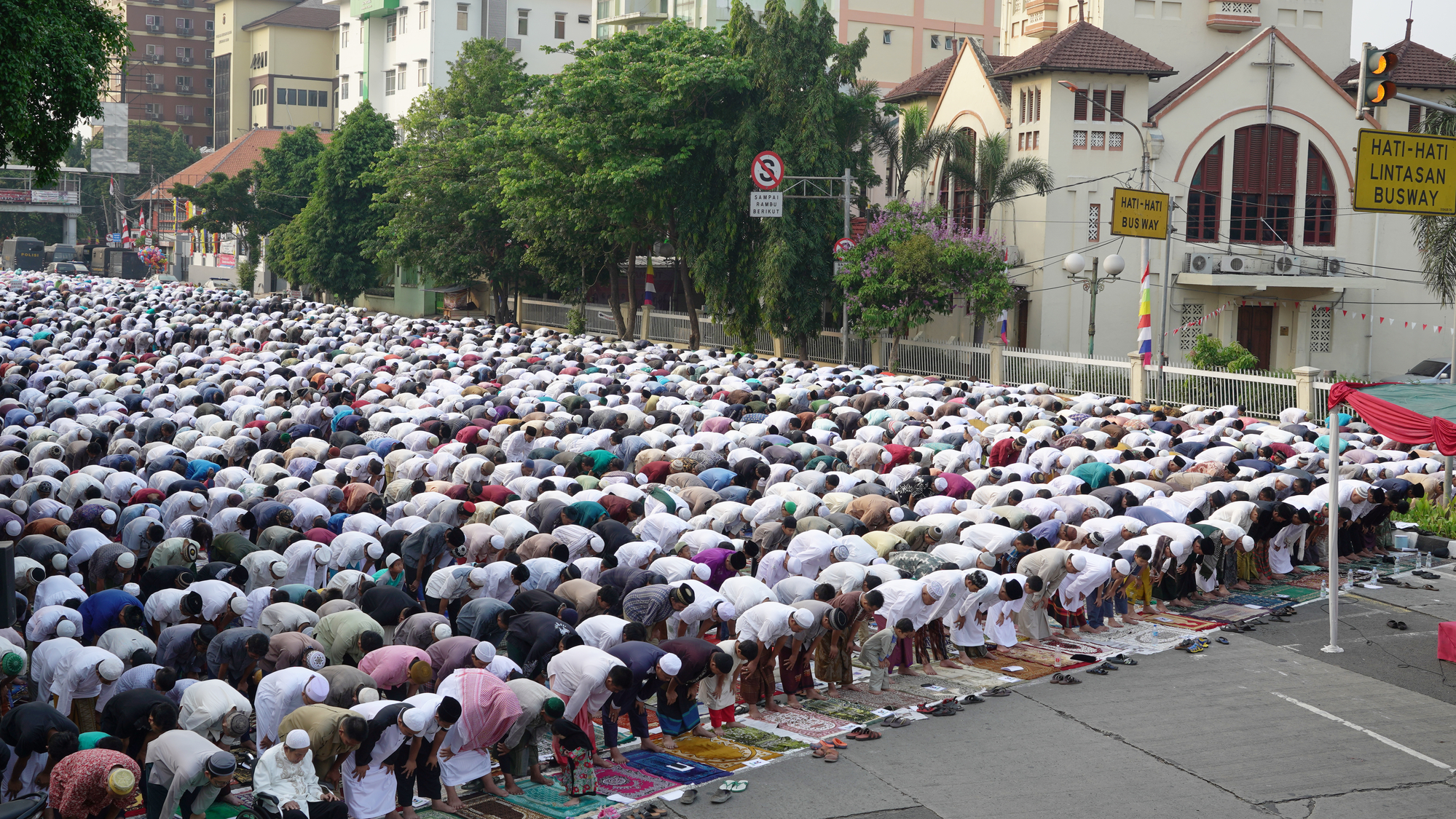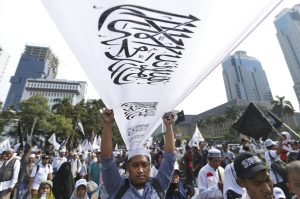In June, Indonesian authorities charged six employees of the nightlife chain Holywings for blasphemy after the chain announced an online promotion offering free alcoholic drinks for men named Muhammad and women named Maria. The promotion’s use of the name of the Prophet Muhammad – Islam’s last prophet – sparked outrage in the world’s most populous Muslim nation.
The pressure forced one of the chain’s shareholders, Hotman Paris, to visit the house of the Cholil Nafis, the chairman of the Indonesian Ulema Council, Indonesia’s top Muslim clerical body, to apologize for “offending the Muslim community.” The six staff members now await trial for blasphemy and for breaching Indonesia’s internet law; if found guilty, they face up to 15 years in prison.
This is not the first time that Indonesia has used blasphemy laws to put people behind bars. Although the country promotes itself as a bastion of tolerance in the Muslim world, religious minorities remain on edge and vigilant in an attempt to avoid the sorts of conflicts that befell the employees of Holywings.
In the current climate, any wrongdoings – intentional or otherwise, by Muslims or non-Muslims – can be interpreted as acts aimed at disturbing religious harmony. At times, these actions have also been used as a pretext for political Islamists to promote divisive regulations.
Though religious freedom is protected by Indonesia’s constitution, members of religious minorities and atheists have been increasingly subjected to discrimination. Some have had their houses set afire, their marriages unacknowledged by the state, and their teachings prohibited.
Upon declaring its independence from the Netherlands in 1945, Indonesia established the national ideology of Pancasila. Its first principle is the “belief in the one and only God,” while its fifth guarantees “social justice” for all.
But with 87 percent of the population being Muslim, in practice, only one religion really counts: Islam.
Nearly all of Indonesia’s Muslims are Sunni, the largest branch of Islam globally, while other minority Islamic sects, such as the Shiite and Ahmadiyya, face resistance from political Islamists.
Andreas Harsono, a senior human rights researcher for the advocacy group Human Rights Watch (HRW), said there are followers of political Islamism who want to establish an Islamic state or implement Sharia in Indonesia.
“The interpretation of the Sharia is also meant to discriminate non-Muslims, non-Sunni [Muslims], ethnic religions, women, and LGBT individuals,” Harsono said. Sharia is a religious law that forms part of the Islamic tradition.
Islam came to Indonesia through the province of Aceh, located on the northwest tip of Sumatra Island, in the 13th century. To date, Aceh is the only Indonesian province to implement Sharia.
Two laws currently allow the possibility of discrimination against non-Muslims, non-Sunni Muslims, and other minority religions: the Blasphemy Law of 1965 and the Religious Harmony Regulation of 2006. President Susilo Bambang Yudhoyono, who served from 2004 to 2014, strengthened the Blasphemy Law and created the Religious Harmony Regulation. Harsono explained that these two laws branch out into many oppressive regulations, which give the majority veto power over minorities.
Protecting “The Six”
In the Blasphemy Law, only six religions – Islam, Protestantism, Catholicism, Buddhism, Hinduism, and Confucianism – are explicitly mentioned and protected, leading to the misinterpretation by many that Indonesia only recognizes six religions. Anyone convicted of violating the law faces up to five years imprisonment.
“Indonesia does not recognize the existence of certain religions or formalize certain religions,” said Lukman Hakim Saifuddin, Indonesia’s former minister of religion. “The six religions … are religions that are embraced by a majority of Indonesian citizens.”
The state allows the existence of religions outside the six as long as they do not violate any regulations or laws. Indonesia has 245 native religions with more than 400,000 followers.
However, adherents of religions beyond the six protected faiths remain the country’s most socially vulnerable minority groups.
Every Indonesian must declare a religion on a mandatory national identity card at age 17; most are expected to choose a religion from the six.
Although under a 2006 law it is possible not to do so; only a few are aware of this law. Dewi Kanti Setianingsih, a Jakarta resident and follower of the Sunda Wiwitan religion – a traditional religion not protected by the Blasphemy Law – is one of the few Indonesians who choose not to state their religion on their ID card.

The Indonesian national ID card of Dewi Kanti Setianingsih. The column highlighted in red, referring to her religion, has been left blank. (Courtesy of Dewi Kanti Setianingsih)
“It’s not that I do not want to put my religion, but there has been no room in the country to fulfill all my needs,” Setianingsih said.
Since 2006, followers outside of the six protected religions can put a dash in the corresponding column of their ID card. But in 2017, the Constitutional Court granted a judicial review that allows followers outside the six religions to put in the religion column the generic phrase “Kepercayaan Terhadap Tuhan Yang Maha Esa” (the Belief in God Almighty).
Individuals who do not declare a religion are at risk of being labeled “godless” by some clerics and officials, and are vulnerable to blasphemy prosecutions, which can often be brought on flimsy pretenses. “Blasphemy [could be] whatever,” Harsono said. “You protest about a loud mosque, it is blasphemy; you talk about the Quran for political purposes, that’s blasphemy.”
Moreover, if individuals select one of the six, regardless of their own religious beliefs, they can be accused of falsifying their identity, according to HRW. In 2012, a self-declared atheist, a Shiite cleric, and a spiritualist were all jailed for blasphemy after listing Islam as their religion.
A biological descendant of the founder of Sunda Wiwitan, Setianingsih was frequently labeled “godless” when in grade school because she did not belong to a mainstream religion.
Once, when she lost her driver’s license, the police could not process a letter of explanation of the loss report because the system required Setianingsih to state her religion, which was not listed. When she tried to open a bank account, the system only allowed the six options listed in the Blasphemy Law, so the staff chose a random one from the list – one that was not her own.
“Systematically, [I was] forced to choose a religion,” she said.
Since 1964, the Coordinating Board for Monitoring Mystical Beliefs in Society in West Java has refused to recognize Sunda Wiwitan wedding ceremonies. As a result, Sunda Wiwitan marriages are not included on the country’s mandatory national family cards.
It’s a similar issue for the Baha’i community. The Baha’i religion, which was established in Baghdad in 1863, was banned outright by Indonesia’s first president, Sukarno, in 1962. In 2001, President Abdurrahman Wahid revoked the ban.
But HRW reported in 2011 on two Baha’i families that were unable to obtain ID cards, birth certificates, and marriage certificates because the system did not include their religion in the province of Lampung. In the same province, the police sided with Islamist militants against two Baha’i followers and pressured them to convert to Islam or be expelled from their village.
Members of the Indonesian Baha’i community declined to be interviewed for this article.
The current Indonesian President Joko “Jokowi” Widodo’s administration has seen the use of the Blasphemy Law as a political weapon – most notably, in the case against then-Jakarta Governor Basuki Tjahaja Purnama, known commonly by his nickname Ahok.
In May 2017, Ahok was imprisoned for two years after being convicted of insulting Islam by referring to a verse of the Quran during a gubernatorial campaign speech. Ahok, who is both Christian and of Chinese descent, implied that Islamic leaders tried to trick voters by using verses from the Quran to argue that Muslims should not vote for a non-Muslim leader.
The remark was caught on video and uploaded to YouTube, where it quickly went viral. Although some believed that the video was edited before being uploaded to make it more incriminating, Ahok’s remark sparked outrage among religious hard-liners and political Islamists, who demanded that he be charged.
Another prominent case involved Alexander Aan of West Sumatra, a former atheist who was convicted in 2012 of blasphemy. He was sentenced to 30 months in prison and fined 100 million rupiah ($7,000) after posting the phrase “God does not exist” on Facebook.
Teaching Religion
Religion plays such a vital role in the social life of Indonesians that state schools require students to study the religion they have declared.
Harsono said theoretically state schools should have six religion classes. But most schools do not have the budget to hire teachers for all six religions.
“So they hired only Islamic teachers and, in some cases, Christian teachers. … Only expensive schools could provide the six,” Harsono said.
When a student is an atheist or follows a religion that is not one of the six protected religions, they face possible discrimination in the school. In 2016, Zulfa Nur Rohman, a follower of a traditional religion called Hayu Ningrat, had to repeat the 11th grade because he refused to participate in “the practice of reading the Quran and performing prayer,” the Jakarta Globe reported.
Meanwhile, Setianingsih said that Sunda Wiwitan followers tend to take either Islamic or Christian studies, as schools do not have Sunda Wiwitan teachers.
Stephen, a 21-year-old Jakarta resident, whose real name has been withheld for his protection, claims he has no religion and has faced a similar issue at school.
“I do believe in God, I just don’t want to stick to one religion,” he said.
When he was in high school, the vice principal came to Stephen’s classroom and asked the students to choose a religion class.
“I raised my hand and said, ‘I have no religion,’” he said.
“You need to choose one,” the vice principal replied.
Stephen asked if he could stay in the library instead but was denied. He was told that taking a religion class was mandatory, and he eventually took Catholic classes.
Growing Violence and Attacks
Christianity is the largest minority religion in Indonesia. Therefore, Christians experience firsthand the harms of oppressive regulations. For instance, under the Religious Harmony Regulation, houses of worship need to be licensed, signed, supported, and approved by at least 150 local residents and local officials. Consequently, more than 2,000 churches have closed since the regulation was enacted.
Christians have also experienced violence. In November 2020, a Christian-majority village in Sulawesi was attacked by the East Indonesia Mujahideen, an affiliate of the Islamic State. Four people were killed and six houses and a church were burned down. An estimated 750 villagers fled their homes and sought shelter more than eight kilometers away. Since 2012, the group has killed more than 20 people, including Muslims, Christians, and Hindus, according to Institut Mosintuwu, an organization aiming to end religious violence.
Last March, suicide bombers attacked a Catholic church in Makassar, injuring at least 14 people, reported Christian Solidarity Worldwide (CSW), a human rights organization.

Indonesian Muslims pray on Eid Al Fitr outside the Koinonia Church in Jakarta, Indonesia, September 18, 2018. (Depositphotos)
It isn’t only non-Muslims who face discrimination and threats; Islamic minority sects face similar issues.
In 2008, the Indonesian government signed a decree that disallowed the Ahmadiyya, a minority Islamic sect, from spreading its teachings. The decree was made under the Blasphemy Law. Violators of the decree face a five-year prison term.
The Ahmadis are subjected to prosecution because political Islamists believe Ahmadis have deviated from mainstream Islam, as they do not recognize Muhammad as the last prophet.
Kandali Achmad Lubis, the secretary of external affairs of Ahmadiyya Indonesia, which represents the minority group, said that Ahmadiyya followers are still Muslims who practice the teachings of Islam.
“We don’t teach new teachings, we just strengthen and expand the teachings of the Quran,” he said.
Although Saifuddin said the 2008 decree requires the citizens and local government to protect Ahmadiyya followers, Ahmadiyya prosecutions continue. In 2018, the news agency Suara reported that 24 Ahmadis from seven families were expelled from, and prosecuted in, their village in East Lombok.
Last September, an Ahmadiyya mosque was attacked and burned by about 200 people from the Alliance of Muslims in Sintang, West Kalimantan. The group insisted that the local government close the mosque and forbid the teachings of Ahmadiyya. The mosque is believed to have no valid building permit, reported Indonesian news agency Tirto.
To date, more than 30 Ahmadiyya mosques have either been burned, attacked, or closed by the government. Harsono said that the 2008 decree “opened the door of attacks against Ahmadiyya mosques.”
One incident that involved the Ahmadiyya gained worldwide attention a decade ago in a village in Banten. A mob of 1,500 attacked 21 Ahmadis, brutally killing three. Though police were present, they were outnumbered by the crowd.
“When the attackers caught me, they stripped me naked on the road, dragged me through a river, beat me with sticks and machetes and tried to cut off my penis,” one survivor told CSW.
Another Islamic minority sect, the Shiite Muslims, also faced intimidation and threats. In 2012, a Shiite-majority village was attacked and burned by a mob of Sunni Muslims in Madura, East Java. In the attack, a 45-year-old woman was killed and several people were seriously injured.
“The conflict between Sunni-Shiite exists, in my opinion, because of a group of people who provoke [and] exaggerate the differences that exist between the Shiite and Sunni,” said Abdillah Baabud, a Shiite cleric in East Java.
Baabud affirmed that Shiite Muslims are relatively safe from attacks, but there were times when some events have been disturbed. In August 2020, a group of youths attacked a Shiite pre-wedding ceremony in Solo, Central Java, shouting anti-Shiite slogans and assaulting participants, according to a report by the U.S. State Department. Several suspects were arrested and charged with assault.
The same month, Shiite Muslims were assaulted while attending a welcome dinner for a new Shiite leader in the community, resulting in injuries to two youths, according to the report.
No End In Sight
The stakes are so high that the United States, Australia, Japan, European, and Latin American countries have warned Indonesia about its growing religious intolerance. Other Middle Eastern countries, like Qatar and the United Arab Emirates, have acted similarly.
The U.S. State Department published a 30-page human rights report about Indonesia’s religious freedom issue last year and has contributed more than $40 million to assist Indonesia in promoting religious tolerance. The U.S. Embassy in Jakarta works with human rights organizations, government officials, universities, and research institutions to promote tolerance.
However, there is a way to end all the terror: “Abolish all of these discriminatory laws,” Harsono said. At the least, the government could simply “not implement them.”
Despite reports of discrimination, Saifuddin believes the laws should not be abolished, claiming they are proof of the state’s responsibility to protect minorities. Saifuddin said even with regulations, minorities still face discrimination, and if the regulations are abolished the situation could get worse.
In 2018, a request to abolish the Blasphemy Law was rejected by the Indonesian Constitutional Court.
“The enemies are ignorant, narrow-interest people – not the Muslims of course,” Harsono said. “Of all the people who work to defend religious freedom are mostly Muslim themselves. You have to differentiate … political Islamists and Muslims.”
Harsono said to never underestimate what outside influence and warnings can do to Indonesia.
“Indonesia is a complicated country,” Harsono said. “I’ve been fighting, writing, talking about this for more than 20 years. I just hope before my time has come, those two laws will be abolished.”
































